This Week in Labor History
October 02
American Federation of Labor officially endorses campaign for a 6-hour day, 5-day workweek – 1934
Joining with 400,000 coal miners already on strike, 500,000 CIO steel workers close down the nation’s foundries, steel and iron mills, demanding pensions and better wages and working conditions – 1949
Starbucks Workers Union baristas at an outlet in East Grand Rapids, Mich., organized by the Wobblies, win their grievances after the  National Labor Relations Board cites the company for labor law violations, including threats against union activists – 2007 National Labor Relations Board cites the company for labor law violations, including threats against union activists – 2007
(Grievance Guide, 13th edition: This easy-to-use handbook documents patterns in a wide range of commonly grieved areas including discharge and discipline, leaves of absence, promotions, strikes and lockouts, and more. The editors give a complete picture of the precedents and guidelines that arbitrators are using to address grievance cases today.)
Union members, progressives and others rally in Washington D.C., under the Banner of One Nation Working Together, demand “good jobs, equal justice, and quality education for all.” Crowd estimates range from tens of thousands to 200,000 – 2010
October 03
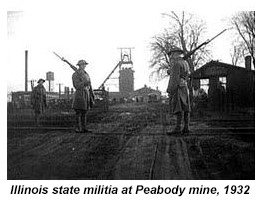 The state militia is called in after 164 high school students in Kincaid, Ill., go on strike when the school board buys coal from the scab Peabody Coal Co. – 1932 The state militia is called in after 164 high school students in Kincaid, Ill., go on strike when the school board buys coal from the scab Peabody Coal Co. – 1932
The Industrial Union of Marine and Shipbuilding Workers of America is founded in Camden, N.J. It eventually merged with the Int’l Association of Machinists, in 1988 – 1933
Pacific Greyhound Lines bus drivers in seven western states begin what is to become a 3-week strike, eventually settling for a 10.5-percent raise – 1945
The United Packinghouse Workers of America (UPWA) is formed as a self-governing union, an outgrowth of the CIO’s Packinghouse Workers Organizing Committee. UPWA merged with the Meatcutters union in 1968, which in turn merged with the Retail Clerks in 1979, forming the United Food and Commercial Workers (UFCW) – 1943
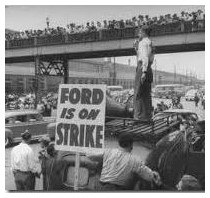 The United Auto Workers calls for a company-wide strike against Ford Motor Co., the first since Ford’s initial contract with the union 20 years earlier – 1961 The United Auto Workers calls for a company-wide strike against Ford Motor Co., the first since Ford’s initial contract with the union 20 years earlier – 1961
Folk singer/songwriter Woody Guthrie (“This Land is Your Land”, “Union Maid” and hundreds of others) dies of Huntington’s disease in New York at the age of 55 – 1967
Baseball umpires strike for recognition of their newly-formed Major League Umpires Association, win after one day – 1970
October 04
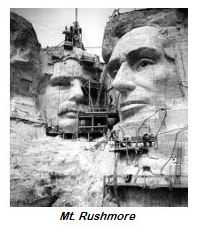 Work begins on the carving of Mt. Rushmore, a task 400 craftsmen would eventually complete in 1941. Despite the dangerous nature of the project, not one worker died – 1927 Work begins on the carving of Mt. Rushmore, a task 400 craftsmen would eventually complete in 1941. Despite the dangerous nature of the project, not one worker died – 1927
President Truman orders the U.S. Navy to seize oil refineries, breaking a 20-state post-war strike – 1945
The United Mine Workers of America votes to re-affiliate with the AFL-CIO after years of on-and-off conflict with the federation. In 2009 the union’s leader, Richard Trumka, becomes AFL-CIO President – 1961
Distillery, Wine & Allied Workers Int’l Union merges with United Food & Commercial Workers Int’l Union – 1995
October 05
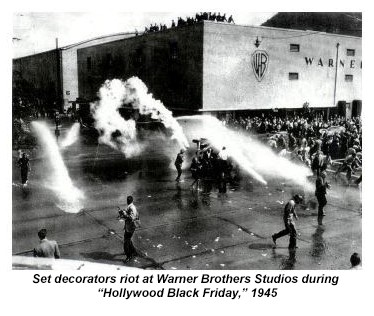 A strike by set decorators turns into a bloody riot at the gates of Warner Brothers Studios in Burbank, Calif., when scabs try to cross the picket line. The incident is still identified as “Hollywood Black Friday” and “The Battle of Burbank” – 1945 A strike by set decorators turns into a bloody riot at the gates of Warner Brothers Studios in Burbank, Calif., when scabs try to cross the picket line. The incident is still identified as “Hollywood Black Friday” and “The Battle of Burbank” – 1945
The UAW ends a 3-week strike against Ford Motor Co. when the company agrees to a contract that includes more vacation days and better retirement and unemployment benefits – 1976
Polish Solidarity union founder Lech Walesa wins the Nobel Peace Prize – 1983
Some 2,100 supermarket janitors in California, mostly from Mexico, win a $22.4 million settlement over unpaid overtime. Many said they worked 70 or more hours a week, often seven nights a week from 10 p.m. to 9 a.m. Cleaner Jesus Lopez told the New York Times he only had three days off in five years – 2004
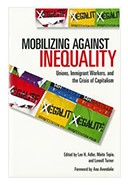 (Mobilizing Against Inequality: Unions, Immigrant Workers, and the Crisis of Capitalism: Are immigrant workers themselves responsible for low wages and shoddy working conditions? Should unions expend valuable time and energy organizing undocumented workers? Unions in Germany, France, the United Kingdom, and the United States have taken various approaches to confront the challenges of this significant segment of the workforce. As U.S. immigration policy is debated, readers will gain insight into how all workers benefit when wages and working conditions for immigrant workers are improved.) (Mobilizing Against Inequality: Unions, Immigrant Workers, and the Crisis of Capitalism: Are immigrant workers themselves responsible for low wages and shoddy working conditions? Should unions expend valuable time and energy organizing undocumented workers? Unions in Germany, France, the United Kingdom, and the United States have taken various approaches to confront the challenges of this significant segment of the workforce. As U.S. immigration policy is debated, readers will gain insight into how all workers benefit when wages and working conditions for immigrant workers are improved.)
October 06
First National Conference of Trade Union Women – 1918
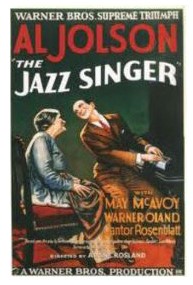 The first “talkie” movie, The Jazz Singer, premiers in New York City. Within three years, according to the American Federation of Musicians, theater jobs for some 22,000 musicians who accompanied silent movies were lost, while only a few hundred jobs for musicians performing on soundtracks were created by the new technology – 1927 The first “talkie” movie, The Jazz Singer, premiers in New York City. Within three years, according to the American Federation of Musicians, theater jobs for some 22,000 musicians who accompanied silent movies were lost, while only a few hundred jobs for musicians performing on soundtracks were created by the new technology – 1927
Some 1,700 female flight attendants win 18-year, $37 million suit against United Airlines. They had been fired for getting married – 1986
Thirty-two thousand machinists begin what is to be a successful 69-day strike against the Boeing Co. The eventual settlement brought improvements that averaged an estimated $19,200 in wages and benefits over four years and safeguards against job cutbacks – 1995
October 07
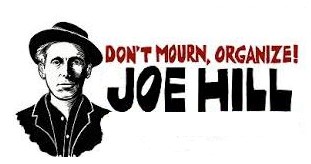 Joe Hill, labor leader and songwriter, born in Gavle, Sweden – 1879 Joe Hill, labor leader and songwriter, born in Gavle, Sweden – 1879
The Structural Building Trades Alliance (SBTA) is founded, becomes the AFL’s Building Trades Dept. five years later. SBTA’s mission: to provide a forum to work out jurisdictional conflicts – 1903
Hollywood’s “Battle of the Mirrors.” Picketing members of the Conference of Studio Unions disrupted an outdoor shoot by holding up large reflectors that filled camera lenses with blinding sunlight. Members of the competing IATSE union retaliated by using the reflectors to shoot sunlight back across the street. The battle went on all day, writes Tom Sito in Drawing the Line – 1946
October 08
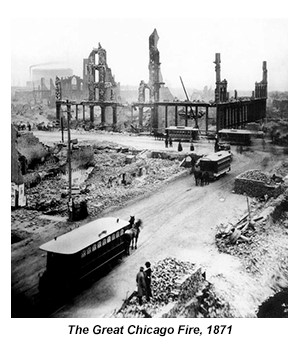 Thirty of the city’s 185 firefighters are injured battling the Great Chicago Fire, which burned for three days – 1871 Thirty of the city’s 185 firefighters are injured battling the Great Chicago Fire, which burned for three days – 1871
In Poland, the union Solidarity and all other labor organizations are banned by the government – 1982
Upholsterers’ Int’l Union of North America merges with United Steelworkers of America – 1985
—Compiled and edited Copyright © 2017 Union Communication Services-Worker Institute at Cornell ILR, All rights reserved.by David Prosten |